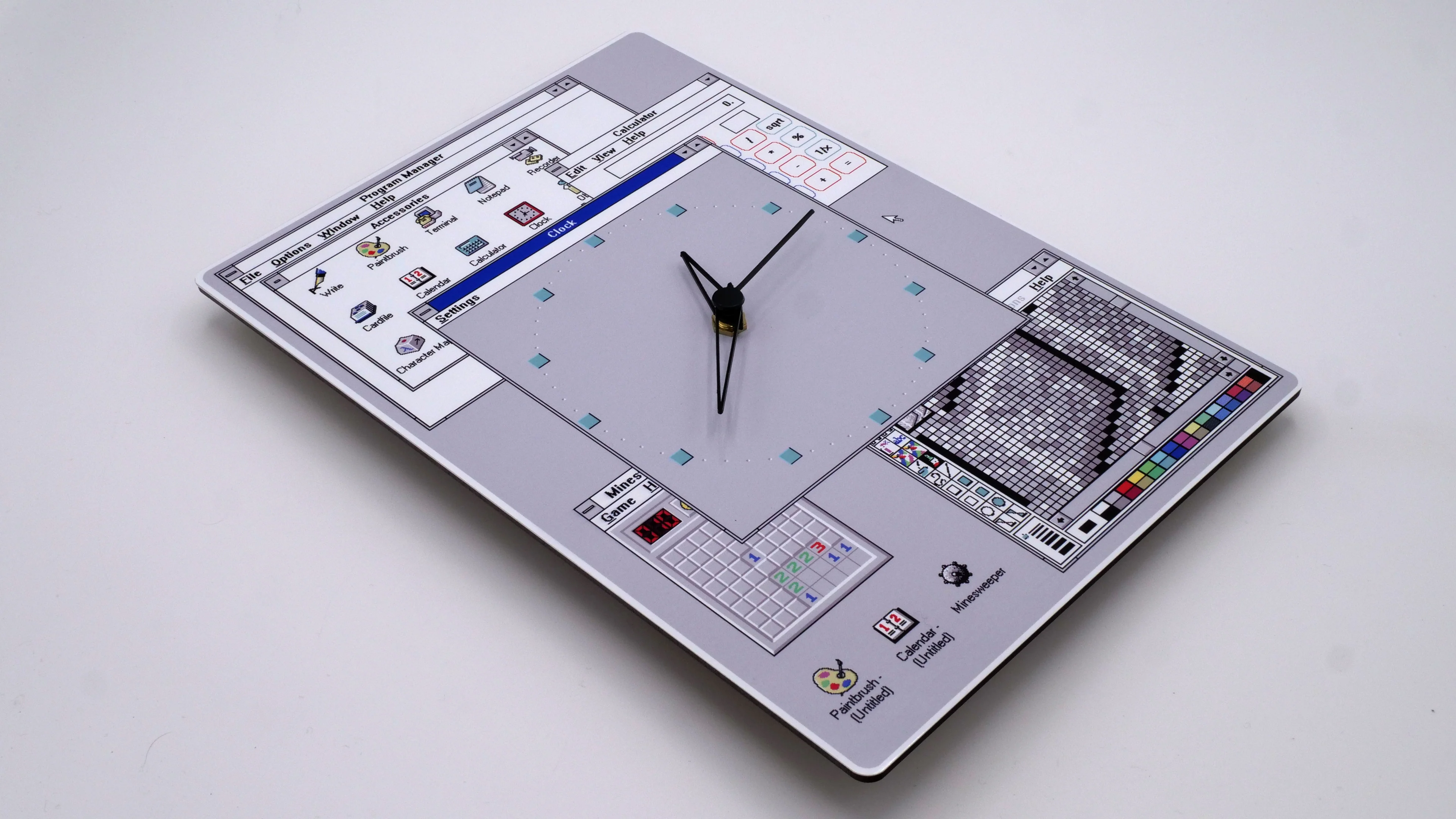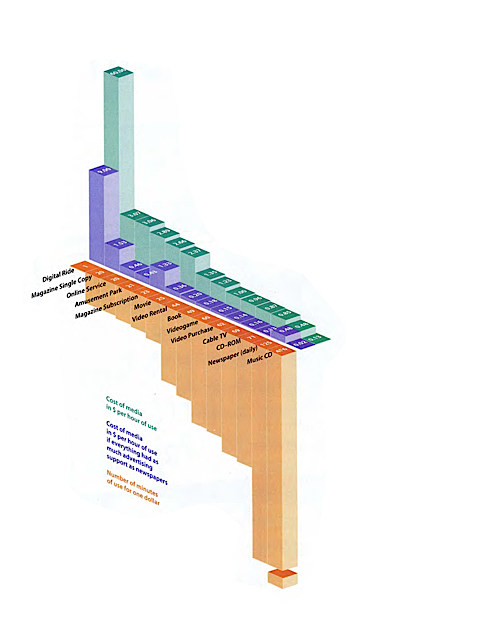Hybrid #6
打开 Teams 要花 96 亿个时钟周期、人生最后一段、怀疑内容、写作,以及你的注意力一小时 2 美元
 Windows 3.1 Style Clock © Retrofied, The Cave
Windows 3.1 Style Clock © Retrofied, The Cave
摘录
Pocket即将于2025年7月8日正式关闭。
Pocket has helped millions save articles and discover stories worth reading. But the way people save and consume content on the web has evolved, so we’re channeling our resources into projects that better match browsing habits today. Discovery also continues to evolve; Pocket helped shape the curated content recommendations you already see in Firefox, and that experience will keep getting better. Meanwhile, new features like Tab Groups and enhanced bookmarks now provide built-in ways to manage reading lists easily.
[…]
This shift allows us to shape the next era of the internet – with tools like vertical tabs, smart search and more AI-powered features on the way.
马晖:……在公司内部,我们这个业务叫“city making”,它分两个主要板块,第一个是advisory咨询类,第二个偏于设计和实施。如果业务的未来目标不清晰、定位不准确、执行路线有较多的不确定,我们会从咨询的角度与业主协商,看我们有没有机会从项目伊始就开始参与、贡献我们在过往项目里得到的经验甚至教训。
在咨询之外,可以看到我们现行的开发建设中一个普遍需要增进的地方,就是如何进行更全方位的整合。整合一方面来自项目背后的利益相关者,另一个部分就是技术专家和管理者对解决方案的整合。某些解决方案可能是单一技术最优,但不是工程整体利益的最优;在这种情况下,整合是奥雅纳能帮助我们的业主、合作伙伴为项目增值的重要举措。
Apple TV+ is streaming an 8-hour remix of the Severance theme by ODESZA that is perfect music for your innie to refine macrodata to. The workday-long video is a 23-minute mix that’s looped and set to footage from the show. Legit adding this to the work music rotation. (via @margarita.bsky.social)
Modern hardware is unbelievably fast. The M1 Max that I’m writing this article on runs at 3.2GHz. That is 3.2 BILLION clock cycles per second. Yet, Microsoft Teams takes 3 seconds to open a link, and I refuse to believe it takes 9.6 BILLION clock cycles to open a link. Obviously, that’s an over-simplification, but the point stands: how is it that hardware gets faster, but the applications we use only get slower?
[…]
The real responsibility lies with the companies building these apps. It’s definitely possible to build good Electron apps - Slack, Obsidian, and Notion are prime examples. You just have to care.
[…]
Clearly, these issues aren’t localized to a specific programming language, operating system, or industry. It’s a broader trend to build things faster and worse. Delivery over quality.
[…]
Stop doing less with more.
I Waited 10 Billion Cycles and All I Got Was This Loading Screen
她認為,年輕人對死亡問題比較沒有包袱,特別是「安寧度假村」會在網路上引發這麼多人共鳴,是因為跟他們日後切身相關。
「年輕人沒有地方死,其實是另一種居住不正義,可是當台灣人現在連死亡都還不能談、不願意談的時候,不會有人去想到臨終地點的問題,要推廣臨終場所實在太困難了。」
佳吟在注射免疫療法隔週就因為喘得離不開氧氣,緊急住進安寧病房。最後一個月,除了醫院安寧團隊的照顧,就依靠朋友的支持跟陪伴。佳吟大學好友怡佳說,佳吟不願意麻煩別人,什麼都要自己做好,但是怎麼可能呢?怡佳幫著佳吟退租房子;在網上建立Google表單,讓好友們每天排班,陪伴佳吟。佳吟每天寫下自己身體的變化跟心情,好友們給她回應。
[…]
人生最後一段為什麼不在家裡度過呢?阿媛說,即使找居家醫療團隊來家裡,也不是很周全,好的看護又不好找,「我不怕孤獨死,但是我擔心鄰居會怕,而且可能讓整棟大樓跌價,那我就太對不起他們了。」
可是當阿媛計畫住到養生村或安養院時,她發現養生村只收健康的老人,而品質評價較好的安養院,她排了多年,都還沒輪到。愛好自由的她,也不確定自己是否能適應安養院的生活。
在醫院很難死,但哪兒可以好死──4個有家「走」不得的血淚告白
阿珍阿嬤述說和其它長者不同的遭遇。家裡做生意,她年幼時家境很好,雖然沒唸很多書,卻嫁給了大學畢業生,先生也對她很好,可是,她卻無法生育。數年後,她為公婆所迫而離婚,只好回到娘家,父母對待她雖然很好,弟弟卻說:「家裡多一個人吃飯!」讓她十分心寒。
這些陳年傷痛經驗,深埋在長輩心中,並未隨時間流逝而淡然;在與同伴互相傾吐後,大家紛紛以同理心互相安慰,抒懷後,深埋心中的遺憾與情結也漸漸放下了。
第四次、也是最後一次團體活動, 我們談的主題是道別。我試探性地或詢問:「如果有一天,你病得很嚴重,可能不久於人世,您最想見誰?」阿桑阿嬤一向都是要再三邀請、一再哄騙才發言的,這次卻主動出來分享。她說:「我的二兒子早年過世,留下兩個孩子,二媳婦出家, 由大兒子將這兩個小孩撫養成人。我很感謝大兒子,希望離世時能見到他。」
一生未娶的阿祥阿公面帶笑容, 他說自己單身, 沒什麼人會來探望他, 我再鼓勵他想想:是否有哪位親人他最想見他最後一面?阿祥阿公表示最想見到妹妹,「我和妹妹相差17歲,從小媽媽就交代我要好好照顧妹妹,我還曾揹著妹妹、餵妹妹喝牛奶。」一般長輩多希望與兒女道別,但那些孤家寡人的長者,多已跟親人失聯多年,相對下較少依戀,也沒什麼捨不得或放不下的。
[…]
在老吾老院服務的長者,大多來自獨居或窮困家庭,他們的一生可能經歷了貧苦或悲苦的事件,但是他們從中也感受到他人的愛心,令他們感恩,他們曾有受傷、遺憾的經歷,需要被瞭解與接納,最後得以釋懷。
道謝、道愛、道歉、道別, 四道人生的習題並非臨終時才做; 由於面對死亡是相對漫長的過程,可以鼓勵長者趁自己意識清楚時就談, 就像前述帶領的四道人生團體經驗,長輩在回顧自己一生經歷同時,也學會了化解恩怨情仇, 放下遺憾, 最後才能充滿感恩地離開。
What will happen when A.I. systems begin pulling people into formation? We can get a glimpse of the possible consequences by looking at what’s already happened on the pre-A.I. Internet. Harari cites a 2022 study, conducted by the digital-intelligence firm Similarweb, which showed that between twenty and thirty per cent of the content on Twitter was posted by bots, which in turn constituted only five per cent of that platform’s user base. It’s no stretch to say that a platform like Twitter is in itself a kind of bot; its algorithms decide, in an automated fashion, what users should see. On such a platform, therefore, swarms of bots interact with a mega-bot, while human beings read and respond alongside. If this phenomenon were amplified—and if the bots and algorithms were capable of holding intelligent conversations—the likely outcome is “digital anarchy,” as Harari puts it. Conversations among machines will shape conversations about humans. “The public sphere will be flooded by computer-generated fake news, citizens will not be able to tell whether they are having a debate with a human friend or a manipulative machine, and no consensus will remain about the most basic rules of discussion or the most basic facts.”
[…]
The key step is the last one. As the density, pace, and fluidity of information have increased, we’ve become more conscious of the role it plays in our lives—and more suspicious of it.
Are We Living in the Age of Info-Determinism?
什么是自我构建?我对它的理解就在上面的这三个小故事里:
- 表达自己
- 理解自己
- 找到自己的最佳位置
这三件事,又指向了三种盲区:
情绪盲区,我们对情绪以及它背后的来源并不清楚; 认知盲区,我们过往的经历藏着我们理解自己的线索,但我们并未仔细回顾; 行动盲区,我们自我挑战的想法容易被禁锢在旧有的互动模式中; 而在写作中,我们可以尝试三件事:
通过自我觉察,识别那些被压抑、被忽略的的情绪; 通过回顾过往,让感受和经历建立起连接,更清晰地了解自己; 通过主动激发,鼓励自己和外界发起新的互动。
针对这三件事,我在整理写作内容时,还会问自己几个问题:
我的感受是什么 我的联想是什么 我的困惑是什么 我的认知转变是什么 我接下来准备做什么
这是我的一个写作理念,我认为在非虚构写作里分析文献是不合适的。你不知道是在写理论的探讨、社会的分析,还是在写人。而我所有写作都是写人的,不是写人的群体,就是写人的个体。包括《汉水的身世》,我写的也是一条河和它周围的人。
我基本上不会把人的故事当作一种阶级属性、社会属性来写。如果皮村文学小组的成员们是一个群体,我也仅仅觉得是因为他们在这里共同学习,他们彼此之间有情感的连接,在处境和人性上有一些共通之处,我不会做进一步的延伸。
[…]
在文学里写人,你关心的是人,不是他身上的社会属性。他本身是一个立体的、活生生的人,你把他归到一些社会属性里去后,他就变成了一个扁平的、被分析的社会对象。
[…]
我的书也许有个问题——我不太提供问题的解法,提供“心灵的膏药”。但是这个时代,大家的心灵都很脆弱,需要这种膏药。
但书不能只是按摩几下人的心灵,古往今来,伟大的文学作品都是让你不能释怀的,没有完美的结局,没有情绪的出口。卡夫卡会给人出口吗?他就让我们感到很难受。
我认为读者应该保持一种疼痛的能力,而作者的职责是当一个守夜人,而不是一个心理按摩师。生活本身就不释放你,我来提供释放,只会显得虚假。
尤其是疫情以来,大家对真实的承受能力下降了,更愿意让作者带着我们去分析议题,满足一种简单的正义感。
当一个议题已经很显眼的时候,它需要的不是人们把它推到极致,而是对它本身有一些思考。议题本身可能是出于真实的需求,但也很容易成为脱离了真实的东西。我很警惕预先的议题设置,所以我会远离议题写作,诉诸个体,诉诸人本身。
[…]
可能眼下我们需要文学带来情节的满足、情绪的按摩,大家只有能力承受这些。但是也许有一天,我们的精神有能力去面对一些真实的人和事了,却发现我们没有参照物了,我们写下的记录都是虚假的——我们的历史不在了,只有鸡汤与诗和远方。那不可惜吗?
I’m still trying to solve this intesity dilemma, but it seems the only way to become a better writer is to write more. Consider this a disclaimer, an advance apology, and a big “student driver” sign for this blog.
To help me grow more quickly, please post feedback. Poke holes in my theories. Give counterexamples to my claims. Share your experience.
Thank you for all the insightful comments across the link aggregators. Thank you for brightening up my inbox. Thank you for bringing the best parts of the internet to my feeds on X, Bluesky, and Mastodon.
Thanks. With your continued help, I can [probably] become a better writer, and [maybe] a better thinker.
An Invitation To Shit On My Ideas
It was the anti-Twitter. People were literally running from Twitter to Bluesky, and that is not a way to build something successful.
[…]
And when you’re entirely dependent on that, if a brand like P&G or Unilever doesn’t like what’s happening on the platform, and they threaten to pull the budget, which accounts for like 20% of your revenue? You have no choice, and… you have no choice. If you take a stance, and they pull the budget, and the stock market sees that, the stock price goes from like 70 bucks to 30. Then you have employees leave because they can get greater value elsewhere, and that’s the whole conundrum that you’re stuck in.
[…]
I find it fascinating to watch how these things play out. Again, I think it points to the need for a protocol where you don’t have to make these decisions at all, right? Because you don’t control the protocol. There’s no one single point of failure you can chokehold and bring before Congress and yell at. It’s like Bitcoin, it doesn’t have one leader or one central chokehold element. And I think that’s critical for what it’s intended to do.
The End of Social Media: An Interview With Jack Dorsey
In the advertising business this differential between qualities of attention is often reflected in a metric called CPM, or Cost Per Thousand (M is Latin for thousand). That’s a thousand views, or a thousand readers. This measurement originated in the print business as a way for magazines or periodicals to charge premium prices for material earning greater attention from readers. One luxury publication might demand a CPM of $10, while the local free paper might only get $1. The metric migrated to other media, roughly translating the original “impressions” of printed copies into viewers of shows and hits on websites. Since this cross comparison is a bit of apple-to-oranges, the estimated average CPM of various media platforms range widely. The graph below shows CPM averages (which I compiled from three sources) that range widely, from cheap outdoor billboards to the most expensive AdWords-like ads on search engines like Google.
[…]
Fifteen years ago I calculated the average hourly costs for various media platforms, including music, books, newspapers, movies and the new thing on the block, digital rides (a kind of virtual reality experience). There was some variation between media, but the price stayed within the same order of magnitude. Remarkably they tended to converge on a fairly uniform mean of $2.00 per hour. In 1995 we tended to pay, on average, two bucks per hour no matter for media use. (Below is the chart that appeared in Wired in 1995.) 1
Recently I recalculated the value of our attention for a similar set of media using the same method with this year’s data. The media costs ranged between 50 cents and 5 dollars per hour. Averaged over all media, we tend to spend about $2.50 per hour on media experiences. When I adjusted the 1995 figures for inflation, the average is close to $2.40 in 2010 dollars. That means that the value of our attention is remarkably stable, gaining only a few percent in 15 years. No matter what we are consuming – books, newspapers, movie, music, games — we tend to price it at about $2.50 an hour.
Your Attention is Cheap: $2.50/per Hour
I am not compelled to bake bread, nor provision servers, nor build chips. Yet that itch pervades, and it pulls me toward humor and systems and life and software and structure. And when emotion becomes unbearable, it erupts out of me: fiction, HTML/CSS, crappy robots, sad songs, and so on.
[…]
Soon it will become something else entirely. Because it’s my website and I’m perpetually becoming somebody else.
You’ll change too. Your passions and values will pollinate; your ugly thing – whatever it is – will come alive again and again.
My website is ugly because I made it
I listen and translate. I research and analyze. I strategize and create. I delight and design.
- User Research
- Data Analyzation (Saturate App, Stormboard)
- Translating Data into Design Principles
- Making Design Features Align with Data
- Usability Testing our Interface
- Don’t lie to your users
- Show empathy and face the backlash
- Good faith gestures
- Give your users enough time to migrate
The Skiff Privacy Fiasco, or How not to Shutdown Your Startup
